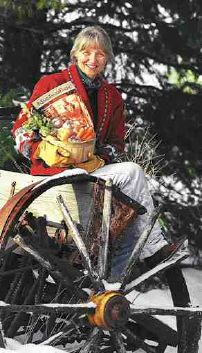|
Organics take root in Idaho By Ken Dey Such fiscal policies may be unheard of on Wall Street, but Butters´ company, Paradise Farm Organics, Inc., nestled in the Palouse region of North Idaho, is far removed from the world of high-stakes investing. And that´s the way Butters and her 55 investors like it. For Butters, a former wilderness ranger with the U.S. Forest Service and an environmental activist, the last decade she´s spent building her organic food company has been more of a passion than a business decision. "I want to feed people," Butters said, and in doing so she wants to make sure it´s healthy food they receive. But for many Idaho farmers, the lure of a better payoff is also a reason to turn to organic agriculture. That lure is so strong that according to figures from the U.S. Department of Agriculture, Idaho is one of the top five states in the nation for organic acreage. Once viewed as food reserved for socially and environmentally conscious consumers, organic crops now are finding their way onto the shelves and coolers of Albertson´s and other mainstream markets. In 2000, organic food sales totaled $7.8 billion, according to a report by the Food Marketing Institute. The same report also found that 69 percent of shoppers surveyed said they bought some organic products. That increased demand has helped Butters and other organic farmers like her gain a foothold in a growing niche market. In Idaho, the Department of Agriculture´s organic food certification program has grown tenfold since 1990, when only 11 farmers signed up. Today, there are 123 certified organic farmers in the state. In roughly the same time period, Butters has gone from selling a few pounds of falafel, a Middle Eastern staple, out of her kitchen to selling nearly $400,000 worth of organic products -- everything from salsas, soups and breads to specialty salad greens. Many of her foods have gained wide acclaim, including a line of backpacking foods that is labeled and distributed by the outdoors company REI. "People are getting very, very hungry for something other than fast food," said Butters, who was in Boise last week to accept the 2001 Progressive Business Person of the Year Award from United Vision of Idaho, a coalition of progressive groups. "You can´t be healthy and live on Twinkies." Butters was recognized by UVI for her efforts to promote a sustainable agricultural system in Idaho by creating a market for locally produced organic foods. "She has a great deal of energy, and when she gets an idea, she goes with it," said investor and long-time friend Sarah Swett. Butters is the first to admit that turning today´s consumers on to the benefits of organic food isn´t going to be an easy task, because organic foods tend to be more expensive than the mass-marketed foods in local grocery stores. "Like any social change you seek to create, it´s done on a one-on-one basis, and you can´t attach yourself to a timeline," she said. Nate Jones, who owns the King´s Crown Organic Farm near Glenns Ferry, said for the first 10 years of his farming career, he farmed his 600 acres using all the standard chemicals, fertilizers and additives. But, 15 years ago, he turned to organic farming, and he isn´t turning back. "The profitability is what got me started," Jones said. "But now it´s more of a philosophical approach and the belief that you don´t need all the agri-business inputs to grow healthy crops." Like their mainstream competitors, organic crops are subject to price fluctuations, but, for the most part, Jones, who also chairs the state´s Organic Food Advisory Council, said his organic offerings still fetch a higher price than crops grown with chemicals. This year, a 50-pound box of his organic, fresh potatoes fetched $24 to $28, about twice the price of its non-organic counterparts. Although he´s enjoying good prices now, Jones said organic growers always walk a fine line between supply and demand. At the moment, organic potatoes represent only about 1 percent of the total potato market. With such a small percentage of demand, Jones worries that the growing interest among farmers could result in supply outstripping demand. That would drive his prices down and wipe out profits. Jones admits that growing organic crops can be a challenge. In many cases, he said, it costs more to grow organic crops than non-organic crops. But even in those cases, he sees advantages. Organic onions are a good example. Onions are very prone to weeds, and when you can´t use chemicals to destroy them, the only other method is manual labor. Jones admits he´s had tremendous labor costs raising onions, but he said at least he knows his labor costs are staying in the community and creating jobs and not going to support out-of-state chemical companies. Jones said he expects demand for organic products to grow and more farmers to give organic farming a try. "I think the hardest part about getting started is to have the courage to know you don´t need it (chemicals)," Jones said. "It´s a niche market, and we want our organic producers to be successful, so we try to work with them to find a place in the market," Pipal said. Sometimes, those markets can be in a grower´s back yard. That is the way it worked for Butters and her company. Butters helps other local organic farmers in the Palouse by buying their organic foods for her packaged products. It was her purchase of a local, organically grown garbanzo bean in 1989 that kick-started her company. In that year, Butters was serving as president of the Palouse-Clearwater Environmental Institute and was fighting a plan to spray pesticides to repel an invasion of Russian wheat aphids. At one meeting on the issue, she met Rod Repp, a local farmer who had planted a variety of garbanzo bean that naturally repelled the aphids. The only problem with the organic, pest-resistant bean was that Repp had no market for the product. But Butters saw a future for the bean and other locally produced organic foods. Intrigued, she decided to buy some beans from Repp. Butters experimented with uses for the bean. Using a hand-powered grinder, she ground the beans into flour, added spices and her falafel was born. Repp, in turn, became one of Butters´ first shareholders. "I´m very much supportive of what she´s trying to accomplish," Repp said. "She´s trying to promote sustainable agriculture on the Palouse, and she´s doing it," said company investor Jack Carpenter, who owns Carpenter Construction in Moscow. "She´s the most high-energy, most innovative woman that I´ve ever met," said Carpenter. "And she´s got a good idea; she´s trying to save the Earth." Saving the Earth, however, hasn´t been easy, as Butters will tell you. At one point she incurred massive credit card debt just trying to keep the company alive, but in 1998, she held a public stock offering that raised nearly $500,000 for the company. "Being an overnight success for us will probably take 20 years," Butters said. That success, however, may come sooner rather than later, thanks to another step by Butters to bring awareness of organic foods. Last month, Butters released her latest venture -- a glossy professional magazine called MaryJanesFarm. The magazine not only serves as the company´s catalog, but also is geared toward women, whom Butters has identified as her main customers. The magazine is filled with tips on how to use the company´s products, as well as feature stories on country living. The magazine is available locally at the Boise Co-Op, 888 W. Fort. St., or by calling 1-888-750-6004. Butters hopes her efforts and those of her supporters will one day raise the stature of organic food and return it to its rightful place, a place where organic food dominates the store´s shelves and food made with fertilizers and pesticides are singled out. "I want to take back our language. I don't want to call it an organic carrot. I want to call it a carrot," Butters said. "And then let them call theirs a chemical carrot." |
Organic farming still a minor part of Idaho's agriculture Despite the growth of organic farming in Idaho, it remains a tiny fraction of the state's totals, in |



